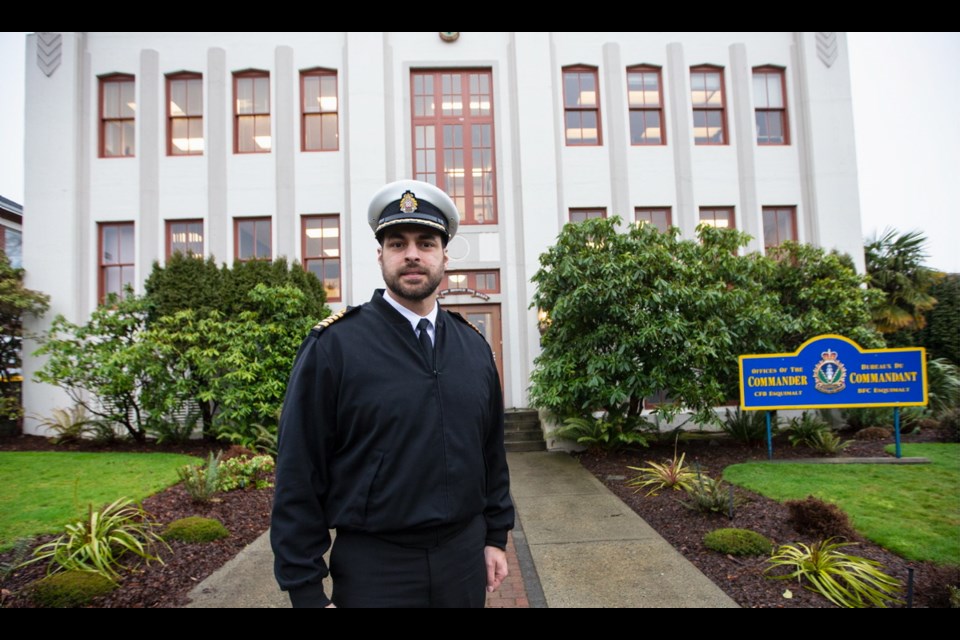Navy Capt. Sam Sader is a logistics specialist in the Royal Canadian Navy. But Sader’s workday can resemble that of a mayor of a mid-sized Vancouver Island city.
Sader’s day as commander of CFB Esquimalt can begin with a meeting of the Greater Victoria Chamber of Commerce, where his position grants him automatic membership. Discussions might occur with various mayors on how to achieve more affordable housing. Like any city, the base has roads and there’s even potholes to be filled.
“There are a lot of similarities when you look at all the infrastructure, the sewage, the road works and we are very integrated with all the municipalities of the [Capital Regional District],” said Sader in an interview with the Times Colonist.
“We have our own fire department, our own police. We even have our own newspaper, The Lookout.”
A common Victoria joke calls the base commander “Victoria’s 14th Mayor.” But it’s not really appropriate. The complex layers of service, function, resources and physical structures at CFB Esquimalt actually dwarf the responsibilities of the 13 CRD mayors.
So complicated and varied is the operation of CFB Esquimalt, it’s surprising to consider that Sader is the first base commander with a background in logistics, the management specialty behind the organization of moving, housing, supplying, feeding and otherwise supporting troops and other military resources when they take to the field.
Until Sader took over last June, base commanders usually came from sailing commands or engineering backgrounds.
A career navy officer and graduate of the Royal Military College, Sader said knew he wanted a career in the forces from the age of 12, when he put on his first uniform — for air cadets.
His family immigrated to Canada from Lebanon when he was 10, first settling in Montreal. He sounds very much like a French-Canadian and now, at 40, still supports the Montreal Canadiens.
Sader said his first posting was to CFB Esquimalt. He met his wife in Victoria and his pre-teen son plays soccer in the winter. So as far as Sader is concerned, “my roots go deep here.”
As commander of CFB Esquimalt, he oversees 6,500 people, about two-thirds of them military. When their families are included, the number of people connected to CFB Esquimalt reaches an estimated 30,000 to 40,000.
In contrast, Langford, the third-largest municipality in the CRD behind Saanich and Victoria, has 35,342 people, followed by Oak Bay with about 18,000. Metchosin has only 4,708 people and the Highlands 2,225.
The base houses the fleet-maintenance facility, a drydock, the national naval training facilities and more than 700 units of housing, ranging from single-person apartments on base to single-family homes in Belmont Park. An estimated total value of all the piers, roads, jetties, warehouses, buildings and other assets is $2.4 billion.
Administration buildings for Canada’s Maritime Forces Pacific are housed at the base. The command centre for all Canada’s submarines on both coasts is there. Administrative support for 443 helicopter squadron on the Saanich Peninsula is also there.
The command umbrella of CFB Esquimalt also covers 23 other sites across B.C., from a torpedo test range at Nanoose to an explosives training facility in Metchosin.
“The tentacles of CFB Esquimalt are really far-reaching,” said Sader. “When people hear CFB Esquimalt, they think of what’s at the end of Esquimalt Road.
“That’s only our most visible, local footprint.”
In terms of its economic footprint, CFB Esquimalt has an annual payroll of $440 million. Combined with local expenditures on supplies and service, the economic impact of the base is estimated at an annual $611.3 million.
The base even pays taxes, or what governments call “payments in lieu of taxes,” to the various municipalities it touches, $24.7 million each year.
The Township of Esquimalt alone gets $18.5 million each year from the base. That accounts for 37 per cent of the municipality’s annual total revenue.
Managing all that money and shifting the ships around the harbour to make room for maintenance and construction work on the base — an estimated $1.6 billion worth in the past decade — means Sader must sit on dozens of work-management committees and administrative groups.
With all that complexity, organization and expense, the reason for the base’s existence can seem small by comparison. It’s the home and support base for five frigates, the workhorse of Canada’s deep-water navy, six Kingston-class coastal defence vessels, three submarines, eight orca-class training vessels and six support vessels, tugs and fireboats.
More navy ships are planned and keels have been laid, which means Sader’s responsibilities will increase to train and accommodate the hundreds of newly trained specialists and sailors the Royal Canadian Navy must enlist.
But it’s the ongoing smooth operation of the existing military platforms, frigates, subs, helicopters and coastal defence vessels that Sader said he must always keep front and centre.
“The reason we exist as a base is to support operations, naval operations, but also any Canadian Armed Forces operations we are asked to complete,” he said. “That has to be at the forefront of my every day.
“What keeps me up at night? What do I wake up in the morning thinking about? It’s ensuring all the services to support naval operations, all those services that I’m responsible for, are available.”



